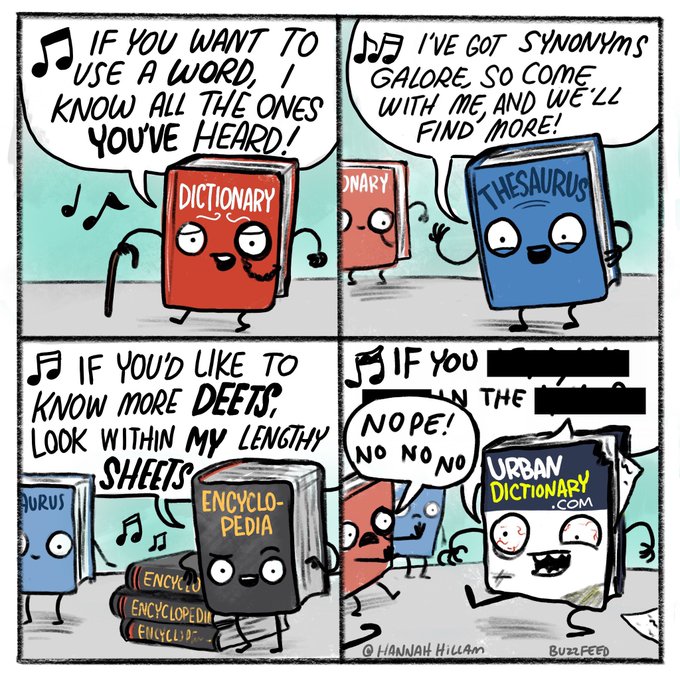We all know those words: the ones you use all the time, or the ones that just seem so boring (I’m looking at you, “nice.”). Let’s say you’re on your second draft, and you come across one of those words. You reach for the thesaurus…

BUT WAIT!
Not all synonyms are created equal, and you might inadvertently choose one that completely changes the way the reader interprets your meaning. So today, we’re going to talk about connotation versus denotation.
This post came about after I read an article about removing certain words and phrases from your writing. In this particular article*, the author suggested the following:
You could mention that a road trip will be “very long” or you could rather describe it as “immense”…
Tonya Thompson, Servicescape.com Blog Post
No. No! Bad! A road trip is not immense. Is “immense” a synonym for “very long”? I mean, kind of. Technically. But it has a vastly different connotation.
Here’s a quick run-down of what connotation and denotation mean – and then I’ll list a few examples of synonyms that work… and synonyms that absolutely in no way work at all.
Connotation: the way a word feels (emotional perspective)
Denotation: what a word means (dictionary perspective)
For a simple example, consider the word “angry.” A thesaurus will give you synonyms like
- mad
- furious
- inflamed
- huffy
- irate
- offended
- sulky
- splenetic
Connotationally, those all mean the same thing.
But reading through that list, I am willing to bet you thought of different things with each word. That’s denotation. Some of the words might be about the order of magnitude of the anger in question (like sulky versus furious). Some of the words may not be commonly used to describe anger (like inflamed). Some refer to a very specific kind of anger (like offended). And some may be an uncommon word that will trip your reader (like splenetic).

There’s more to consider, though, when choosing a synonym. Is this for dialogue? I’ve never EVER heard anyone yell, “I’m just so splenetic!” I doubt I will ever hear that at all – unless someone reads this post and runs up to me just to say it and ruin my perfect track record. (You can try, but you have to catch me first.) Make sure you choose a word that fits your character’s personality AND education level. For example, if the speaker is a toddler, they’d probably say “mad” over “exacerbated.”
If you’re using the word in prose/narrative, there’s the issue of what your narrator would say – and your narrator might use a petty synonym when describing someone they don’t like. Or maybe they use a higher order of magnitude for their own feelings and a lower order of magnitude for someone else’s.
But above all, don’t forget that the word you used initially might be the best word for what you’re trying to convey. Maybe “angry” works. If you use it 15 times on a page, though, you need to rethink your choices.
Let’s look at a handful of examples that use “angry” and see what they’d be like with a synonym instead.
“I am done being careful. I am done being quiet. Let them see me angry. Let them hear me wail at the top of my lungs.”
Leigh Bardugo, Wonder Woman: Warbringer
Using mad or furious would work decently in this context, though furious is a better choice in my opinion. But imagine “Let them see me pouty.” That sounds ridiculous. “Let them see me inflamed” sounds like you need some Benadryl.
What about a movie title like 12 Angry Men? That works well, but 12 Chafed Men or 12 Vexed Men, which technically mean the same thing, are not nearly as catchy, nor do they get the same feeling across.

And consider the Hulk’s famous line: “You wouldn’t like me when I’m angry.” Maybe we’d like him when he’s put out or indignant. Who knows?
Ultimately, you need to pick the best word for the meaning and feeling you want to convey to your reader. If that means using a word you think is boring, then so be it. If you’re using a word entirely too much, your editor, beta readers, etc. should catch it.
* Note: the article I’m referencing is not full of horrible suggestions! There’s some useful information in it, so if you want to work on your writing craft, you could do worse than starting here. Read the full article here: clicky
Photos in this post courtesy of:
